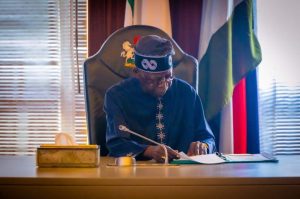 In a tense standoff, the Nigerian government and labour unions have failed to reach an agreement on a new national minimum wage, with both sides digging in over their conflicting demands.
In a tense standoff, the Nigerian government and labour unions have failed to reach an agreement on a new national minimum wage, with both sides digging in over their conflicting demands.
During his Democracy Day address on Wednesday, President Bola Tinubu claimed that his administration had negotiated in good faith with organized labour and reached an agreement on a new minimum wage. However, labour leaders swiftly refuted this assertion, stating that no final deal had been reached as of the last negotiation session on June 7th.
The Nigerian Labour Congress (NLC), through its acting president Prince Adewale Adeyanju, maintained that the labour unions are still insisting on a minimum wage of N250,000 per month. This figure is significantly higher than the government’s latest offer of N62,000, which the NLC has categorically rejected as a “starvation wage.”
The Minister of Information and National Orientation, Mohammed Idris, warned that the NLC’s N250,000 demand could have dire economic consequences, potentially leading to mass layoffs and undermining the welfare of Nigerians. Idris advocated for a “realistic and sustainable” minimum wage system that balances workers’ needs with the broader economic implications.
The state governors have also weighed in, stating that they would not be able to sustain a minimum wage higher than N60,000 per month. This has further complicated the negotiations, with the federal government, private sector, and state governments struggling to find common ground with the labour unions.
Amid the impasse, the NLC has vowed not to accept anything less than its N250,000 proposal, dismissing the government’s offers as inadequate. The labour leaders accused the President’s advisers of possibly misleading him about the status of the negotiations.
With both sides entrenched in their positions, the prospect of a nationwide strike looms large as the labour unions threaten to take drastic action if their demands are not met. The standoff highlights the delicate balance the government must strike between addressing workers’ concerns and maintaining economic stability.
As the negotiations continue, all eyes will be on whether the government and labour unions can find a compromise that satisfies the demands of workers without jeopardizing the broader economic landscape.
The NLC and TUC are rejecting the government’s proposed minimum wage of N62,000, insisting their demand remains at N250,000.
They claim there was no agreement reached between labor and the government during the negotiations. They allege that the President may have been misled by his advisors into believing an agreement was reached. The NLC claims their leaders were intimidated and harassed by security forces during the negotiations. They are appealing to the President to not allow his advisors to undermine the interests of Nigerian workers and the poor. There is also disagreement over the duration of the minimum wage act, with the NLC saying they did not agree to a 5-year duration.
Overall, it seems like a complex situation with both sides making competing claims. The labor unions appear to be taking a firm stance in demanding a much higher minimum wage than what the government has proposed. I would advise closely following further developments and statements from both sides to get a clearer picture of the negotiations and any potential resolutions.

